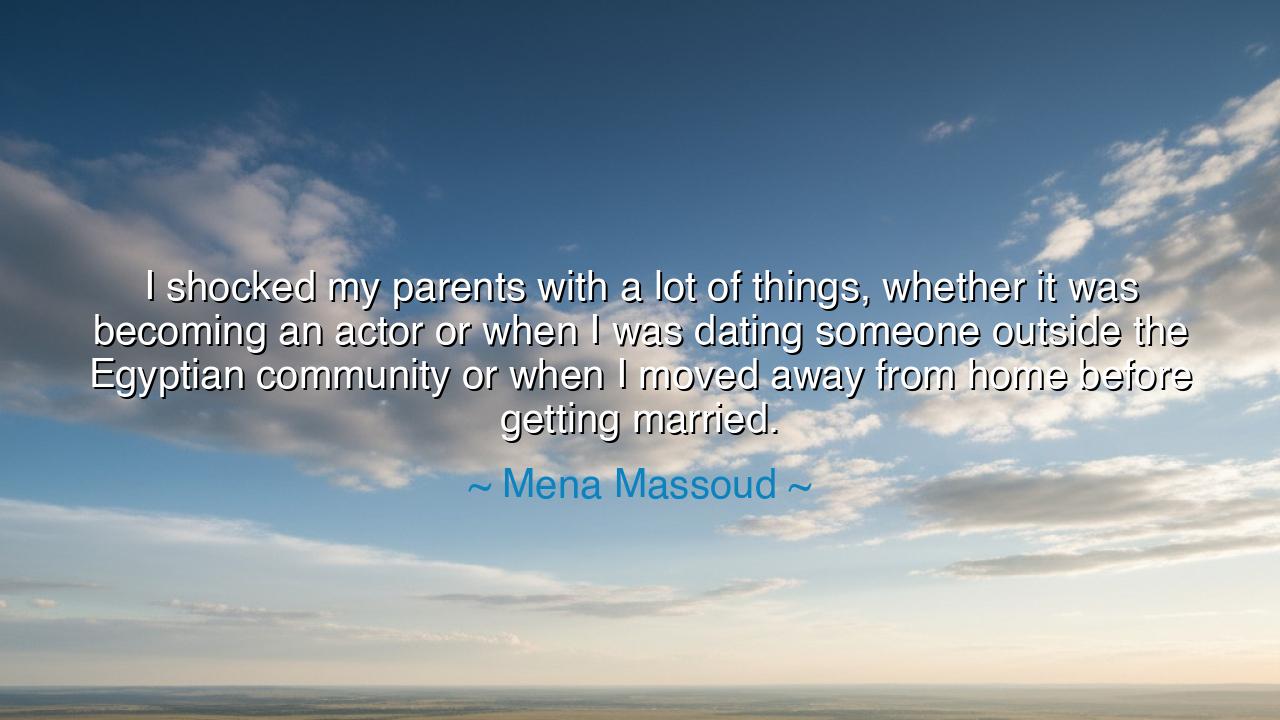
I shocked my parents with a lot of things, whether it was
I shocked my parents with a lot of things, whether it was becoming an actor or when I was dating someone outside the Egyptian community or when I moved away from home before getting married.






When Mena Massoud said, “I shocked my parents with a lot of things, whether it was becoming an actor or when I was dating someone outside the Egyptian community or when I moved away from home before getting married,” he spoke as one who walks between worlds. His words capture the ancient and eternal struggle between tradition and individuality, between the expectations of family and the call of the soul. Beneath his calm tone lies a universal truth—one that has echoed through generations: that to grow, one must sometimes disappoint those they love most, not out of rebellion, but out of the need to become fully themselves.
The origin of his reflection is deeply human. Born to Egyptian parents and raised in a new land, Mena carries within him the heritage of two cultures—one that values collective honor and familial duty, and another that celebrates independence and self-expression. In saying he “shocked” his parents, he reveals not malice, but the pain and necessity of transformation. Every child raised beneath the weight of ancestral expectation must, at some point, step beyond it. The path to becoming one’s true self often begins with the courage to surprise those who shaped you.
To become an actor, as he mentions, is no small act of defiance in many traditional communities. Art, in such worlds, is often seen as uncertain, as a path without security or prestige. Yet the artist’s journey is as old as civilization itself. When the Greek playwright Sophocles defied his father’s wish for him to pursue politics, he was not rebelling against his lineage—he was fulfilling it in another form. Like Mena, he knew that duty can take many shapes. For some, it is to build upon their parents’ foundation; for others, it is to expand it beyond what their parents ever imagined.
His mention of dating outside the Egyptian community carries with it another layer of wisdom. It speaks to the tension between love and belonging, between the safety of the familiar and the openness of the heart. Throughout history, such choices have tested the strength of families and cultures alike. Consider Cleopatra, the last queen of ancient Egypt, whose love for Julius Caesar and later Mark Antony defied borders and alliances. Her heart reached beyond her empire’s boundaries, just as Mena’s choices reached beyond the limits of expectation. Both acts, though separated by centuries, were declarations of the same truth—that love, in its purest form, belongs not to tribes or traditions, but to the soul.
And when he says he “moved away from home before getting married,” he invokes one of the oldest human rites—the act of leaving one’s origins to seek one’s destiny. It is what the ancients called the hero’s departure, the necessary step away from comfort and toward self-discovery. Like the biblical Abraham, who left his homeland for a promise unseen, Mena chose the uncertain road, trusting that growth could not occur within the same walls that once sheltered him. Every generation must face this moment—the moment when love for one’s family must coexist with the courage to walk alone.
Yet, his reflection is not one of rejection. It is one of reconciliation. He does not speak of anger or division, but of the natural friction that arises when new life seeks to break old patterns. In this, Mena teaches a quiet but profound lesson: that to honor your parents is not always to obey them, but to live so truthfully that your choices bring light to their legacy. The shock he speaks of is not the wound of betrayal, but the awakening that comes when parents see their child become something they did not foresee—and yet, something greater than they imagined.
From his words emerges a guiding principle for all who live between the worlds of old and new: respect your roots, but do not let them anchor your wings. The traditions of our ancestors are meant to guide us, not to imprison us. We carry their hopes, yes—but we must also add to them our own. Mena’s journey, like that of many before him, reminds us that the greatest gift a child can give their parents is not imitation, but evolution—to take what was given, and to make of it something new and worthy.
So, let his words be remembered not as confession, but as counsel. When the path of your heart shocks those who raised you, do not despair. Shock is the first sign of awakening. Let love be your compass, integrity your guide, and courage your constant companion. For as Mena Massoud teaches, those who dare to step beyond the boundaries of expectation do not abandon their heritage—they expand it, carrying it forward into a future only the brave can reach.






AAdministratorAdministrator
Welcome, honored guests. Please leave a comment, we will respond soon